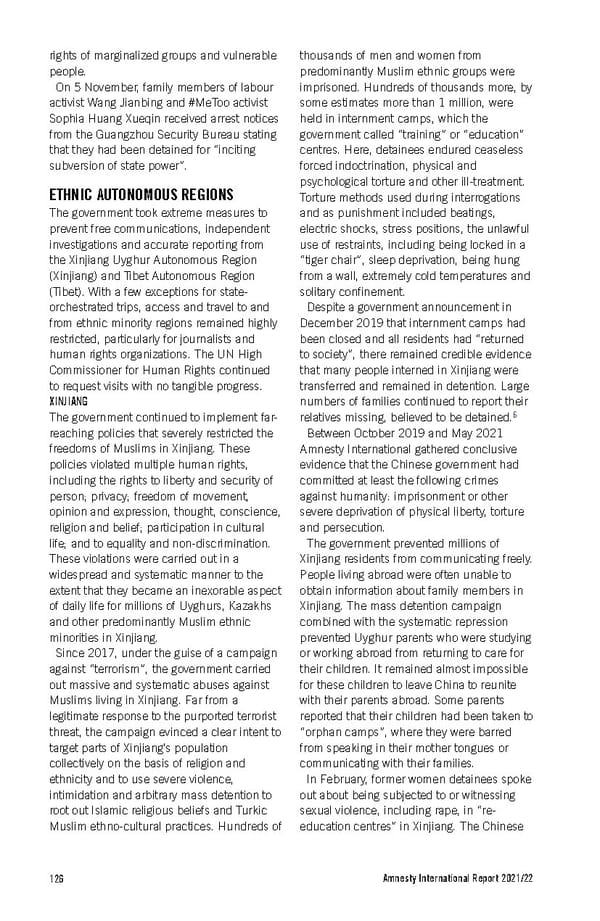rights of marginalized groups and vulnerable thousands of men and women from people. predominantly Muslim ethnic groups were On 5 November, family members of labour imprisoned. Hundreds of thousands more, by activist Wang Jianbing and #MeToo activist some estimates more than 1 million, were Sophia Huang Xueqin received arrest notices held in internment camps, which the from the Guangzhou Security Bureau stating government called “training” or “education” that they had been detained for “inciting centres. Here, detainees endured ceaseless subversion of state power”. forced indoctrination, physical and ETHNIC AUTONOMOUS REGIONS psychological torture and other ill-treatment. Torture methods used during interrogations The government took extreme measures to and as punishment included beatings, prevent free communications, independent electric shocks, stress positions, the unlawful investigations and accurate reporting from use of restraints, including being locked in a the Xinjiang Uyghur Autonomous Region “tiger chair”, sleep deprivation, being hung (Xinjiang) and Tibet Autonomous Region from a wall, extremely cold temperatures and (Tibet). With a few exceptions for state- solitary confinement. orchestrated trips, access and travel to and Despite a government announcement in from ethnic minority regions remained highly December 2019 that internment camps had restricted, particularly for journalists and been closed and all residents had “returned human rights organizations. The UN High to society”, there remained credible evidence Commissioner for Human Rights continued that many people interned in Xinjiang were to request visits with no tangible progress. transferred and remained in detention. Large XINJIANG numbers of families continued to report their The government continued to implement far- relatives missing, believed to be detained.6 reaching policies that severely restricted the Between October 2019 and May 2021 freedoms of Muslims in Xinjiang. These Amnesty International gathered conclusive policies violated multiple human rights, evidence that the Chinese government had including the rights to liberty and security of committed at least the following crimes person; privacy; freedom of movement, against humanity: imprisonment or other opinion and expression, thought, conscience, severe deprivation of physical liberty, torture religion and belief; participation in cultural and persecution. life; and to equality and non-discrimination. The government prevented millions of These violations were carried out in a Xinjiang residents from communicating freely. widespread and systematic manner to the People living abroad were often unable to extent that they became an inexorable aspect obtain information about family members in of daily life for millions of Uyghurs, Kazakhs Xinjiang. The mass detention campaign and other predominantly Muslim ethnic combined with the systematic repression minorities in Xinjiang. prevented Uyghur parents who were studying Since 2017, under the guise of a campaign or working abroad from returning to care for against “terrorism”, the government carried their children. It remained almost impossible out massive and systematic abuses against for these children to leave China to reunite Muslims living in Xinjiang. Far from a with their parents abroad. Some parents legitimate response to the purported terrorist reported that their children had been taken to threat, the campaign evinced a clear intent to “orphan camps”, where they were barred target parts of Xinjiang’s population from speaking in their mother tongues or collectively on the basis of religion and communicating with their families. ethnicity and to use severe violence, In February, former women detainees spoke intimidation and arbitrary mass detention to out about being subjected to or witnessing root out Islamic religious beliefs and Turkic sexual violence, including rape, in “re- Muslim ethno-cultural practices. Hundreds of education centres” in Xinjiang. The Chinese Amnesty International Report 2021/22 126
 Amnesty International Report 2021/22 Page 125 Page 127
Amnesty International Report 2021/22 Page 125 Page 127